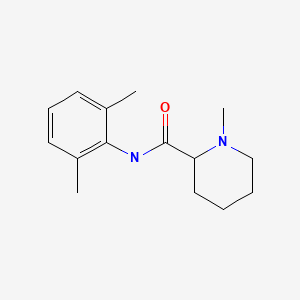Attribution Statement: LactMed is a registered trademark of the U.S. Department of Health and Human Services.
NCBI Bookshelf. A service of the National Library of Medicine, National Institutes of Health.
Drugs and Lactation Database (LactMed®) [Internet]. Bethesda (MD): National Institute of Child Health and Human Development; 2006-.
CASRN: 96-88-8

Drug Levels and Effects
Summary of Use during Lactation
No information is available on the use of mepivacaine during breastfeeding. Based on the low excretion of other local anesthetics into breastmilk, a single dose of mepivacaine during breastfeeding is unlikely to adversely affect the breastfed infant. However, an alternate drug may be preferred, especially while nursing a newborn or preterm infant.
Mepivacaine given during labor as a local anesthetic to the mother has been reported to interfere with initial nursing behavior of some infants, but not weight gain during the first 5 days postpartum. Although not well studied specifically with mepivacaine, it appears that with good breastfeeding support, epidural local anesthetics with or without fentanyl or one of its derivatives has little or no adverse effect on breastfeeding success.[1] Labor pain medication may delay the onset of lactation. More study is required to clarify the effect of mepivacaine during labor on breastfeeding outcome.
Drug Levels
Maternal Levels. Relevant published information was not found as of the revision date.
Infant Levels. Relevant published information was not found as of the revision date.
Effects in Breastfed Infants
Relevant published information was not found as of the revision date.
Effects on Lactation and Breastmilk
In a study that compared extradural administration of mepivacaine, bupivacaine and lidocaine for analgesia during normal childbirth, no differences were found in weight changes over the first 5 days after delivery among the breastfed infants of the 3 groups. Overall weight gain was within normal limits for all groups.[2]
Of 6 infants whose mothers received a pudendal block with mepivacaine within the hour before delivery, 4 took longer to begin nursing behavior and nursed less initially than 10 infants whose mothers received no anesthesia during labor. The long-term consequences of these differences were not reported.[3]
A national survey of women and their infants from late pregnancy through 12 months postpartum compared the time of lactogenesis II in mothers who did and did not receive pain medication during labor. Categories of medication were spinal or epidural only, spinal or epidural plus another medication, and other pain medication only. Women who received medications from any of the categories had about twice the risk of having delayed lactogenesis II (>72 hours) compared to women who received no labor pain medication.[4]
References
- 1.
- Heesen P, Halpern SH, Beilin Y, et al. Labor neuraxial analgesia and breastfeeding: An updated systematic review. J Clin Anesth. 2020;68:110105. [PubMed: 33069970]
- 2.
- Abouleish E, Donck AV, Meeuwis H, et al. Effect of anaesthesia for delivery on the weight of infants during the first 5 days of life. Br J Anaesth. 1978;50:569–74. [PubMed: 666931]
- 3.
- Ransjö-Arvidson AB, Matthiesen AS, Lilja G, et al. Maternal analgesia during labor disturbs newborn behavior: Effects on breastfeeding, temperature, and crying. Birth. 2001;28:5–12. [PubMed: 11264622]
- 4.
- Lind JN, Perrine CG, Li R. Relationship between use of labor pain medications and delayed onset of lactation. J Hum Lact. 2014;30:167–73. [PMC free article: PMC4684175] [PubMed: 24451212]
Substance Identification
Substance Name
Mepivacaine
CAS Registry Number
96-88-8
Disclaimer: Information presented in this database is not meant as a substitute for professional judgment. You should consult your healthcare provider for breastfeeding advice related to your particular situation. The U.S. government does not warrant or assume any liability or responsibility for the accuracy or completeness of the information on this Site.
- User and Medical Advice Disclaimer
- Drugs and Lactation Database (LactMed) - Record Format
- LactMed - Database Creation and Peer Review Process
- Fact Sheet. Drugs and Lactation Database (LactMed)
- Drugs and Lactation Database (LactMed) - Glossary
- LactMed Selected References
- Drugs and Lactation Database (LactMed) - About Dietary Supplements
- Breastfeeding Links
- PMCPubMed Central citations
- PubChem SubstanceRelated PubChem Substances
- PubMedLinks to PubMed
- Review Bupivacaine.[Drugs and Lactation Database (...]Review Bupivacaine.. Drugs and Lactation Database (LactMed®). 2006
- Review Fentanyl.[Drugs and Lactation Database (...]Review Fentanyl.. Drugs and Lactation Database (LactMed®). 2006
- Review Lidocaine.[Drugs and Lactation Database (...]Review Lidocaine.. Drugs and Lactation Database (LactMed®). 2006
- Review Ropivacaine.[Drugs and Lactation Database (...]Review Ropivacaine.. Drugs and Lactation Database (LactMed®). 2006
- Review Levobupivacaine.[Drugs and Lactation Database (...]Review Levobupivacaine.. Drugs and Lactation Database (LactMed®). 2006
- Mepivacaine - Drugs and Lactation Database (LactMed®)Mepivacaine - Drugs and Lactation Database (LactMed®)
Your browsing activity is empty.
Activity recording is turned off.
See more...
